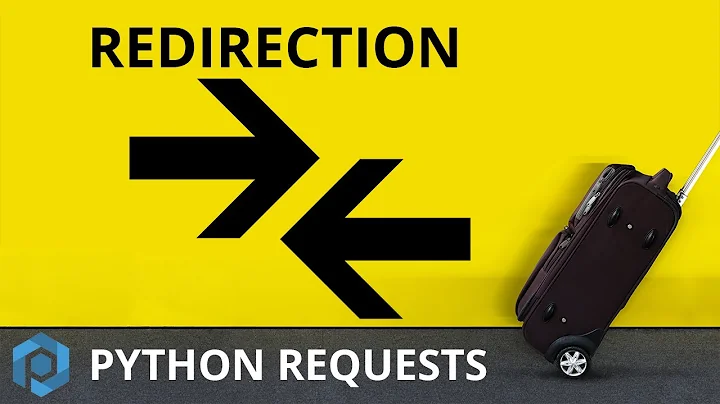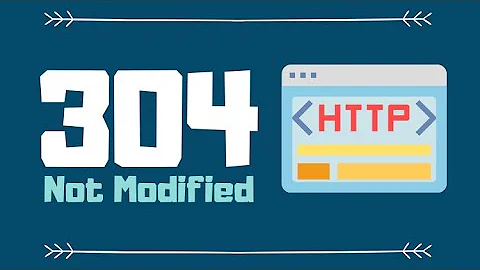Is it possible for XHR HEAD requests to not follow redirects (301 302)
Solution 1
There isn't, this isn't exposed behavior you can stop.
It's because of the spec you linked already, the specified behavior is that XmlHttpRequest should transparently follow redirects...under the covers unfortunately, and not in a way you can prevent.
It's this way to try and make things easier, if resources move, etc...but when it was designed and the spec laid out, all these redirection services weren't out there. There just wasn't a strong need for any other behavior or ability to prevent it, I think with as many redirects hitting the web not we'll see the ability added, but who knows when every browser would support it.
Solution 2
The W3C specification requires that redirects are followed automatically, as @Nick suggested in the other answer. However a property to disable redirects is being considered by the W3C for a future version of this specification:
This specification does not include the following features which are being considered for a future version of this specification:
- load event and onload attribute;
- error event and onerror attribute;
- progress event and onprogress attribute;
- abort event and onabort attribute;
- Timers have been suggested, perhaps an ontimeout attribute;
- Property to disable following redirects;
- responseXML for text/html documents;
- Cross-site XMLHttpRequest;
- responseBody to deal with byte streams;
- overrideMimeType to fix up MIME types;
- getRequestHeader() and removeRequestHeader().
However, I wouldn't hold my breath until this is implemented by all browsers. You may want to use a server-side proxy to handle this. Simply write a short script to do a HEAD request in your favourite server-side language/framework, and then use Ajax to query this service. You would also be able to do requests to third-party domains through the proxy as a positive side-effect.
Related videos on Youtube
Comments
-
antonj about 2 years
Is it possible to send an xhr HTTP HEAD request to only get header response for the first request and not automatically follow 301, 302 like redirects? I'm only interested in getting the new location of the url. Example:
var xhr = new XMLHttpRequest(); xhr.onreadystatechange = function(data) { if (xhr.readyState == 4) { if (xhr.status == 301 || xhr.status == 302) { // Get new location url don't GET it } } }; xhr.open('HEAD', url, true); xhr.send();http://www.w3.org/TR/XMLHttpRequest/#infrastructure-for-the-send-method seems to specify that requests should be followed, is there a way to stop this?
-
user about 8 yearsPossible duplicate of Prevent redirection of Xmlhttprequest
-
-
antonj over 13 yearsIs this implemented in any browsers at all? I'm mostly interested in a solution/hack for google-chrome/webkit.
-
Daniel Vassallo over 13 years@Blastura: Not sure about that, but I don't think it is.
-
ehretf over 11 yearsHello Nick, thx for our answer, this helped me. However I would like to know if there is any way to retrieve the final URL to which the redirection(s) point(s) to?
-
Alix almost 11 yearsHi @nick-craver and antonj, I think stop the redirection is possible. Please check my answer below and try my code. Thanks.
-
Iulian Onofrei almost 10 yearsIs that jquery or php? (joke)
-
 EricLaw about 8 yearsThe new
EricLaw about 8 yearsThe newfetch()API acquired this feature, but that API today lacks some features in XHR (including timeouts and cancellation) -
tarun713 about 6 yearsThis actually DOES follow the redirect and retrieves the data at the resulting URL though, correct? This just allows you to understand that you were redirected afterwards, unless I'm missing something?
-
Petschko almost 5 yearsIt follows the URL (load it), you can notice best, when it redirect to an other domain, you still get the blocked CORS warning inside the Console

![Fix CORS Error [SOLVED] | React Tutorial](https://i.ytimg.com/vi/hxyp_LkKDdk/hq720.jpg?sqp=-oaymwEcCNAFEJQDSFXyq4qpAw4IARUAAIhCGAFwAcABBg==&rs=AOn4CLDs0NMhm3WR0Mqp4qKMm_85b3Ee_A)
![CORS Error & Solutions In A Nutshell [Cross Origin Resource Sharing]](https://i.ytimg.com/vi/gPzMRoPDrFk/hq720.jpg?sqp=-oaymwEcCNAFEJQDSFXyq4qpAw4IARUAAIhCGAFwAcABBg==&rs=AOn4CLCL9ZbwLoTEYnPYQFHRmL1ZdqSvVg)




